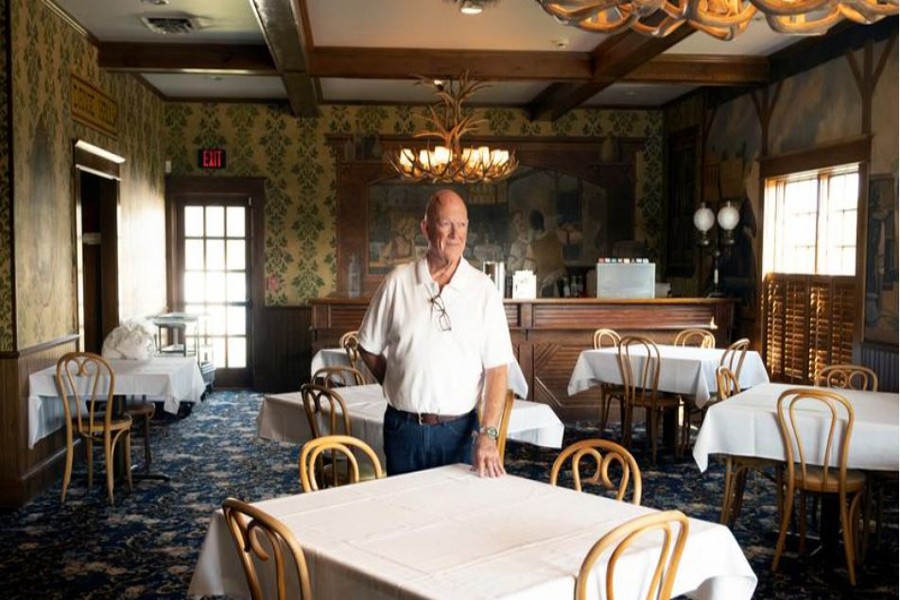Mark Martin’s family restaurant weathered two world wars, the Dust Bowl, and the Great Depression, serving up heaping plates of hand-battered fried chicken, mashed potatoes and creamed corn to a devoted clientele. But it could not survive the pandemic, reports Reuters.
The restaurant, nestled by the highway in Abilene, Kansas, closed permanently on September 25, after struggling to break even amid shutdowns caused by the COVID-19 outbreak.
“We’re kind of in shock that this will be the end of it for us,” said Martin, the fourth generation to run the Brookville Hotel, a name that reflects its origins as a small hotel in nearby Brookville, Kansas that his family acquired in 1894.
The virus has upended travel and spending habits for millions of Americans. Small business failures in the first months of the pandemic were modest, however, as federal aid helped companies make payrolls as they waited for life to return to normal.
But the virus continues to spread, shattering records for new cases in the Midwest last week, while emergency federal aid is running out. With cold weather and flu season nearing, which typically brings a drop in business for restaurants even in good years, Brookville's fate may be a harbinger of things to come.
Based on an analysis of credit card transactions by the online marketing firm Womply, one in five small businesses in the United States open at the beginning of 2020 had permanently stopped operating as of mid-September - including 23 per cent of restaurants. About 40 per cent of restaurants recently surveyed by the National Restaurants Association say they will be out of business in six months unless there is more financial relief from the government.
Martin, 70, said he was hopeful in the first months of the pandemic. The restaurant secured a $57,000 loan through the federal government’s Paycheck Protection Program - a vital lifeline, he said. Three-quarters of that went to pay his several dozen employees, “which allowed us to free up those dollars to pay other expenses, like the mortgage and gas bill — all the stuff a restaurant needs,” he said.
They reopened Easter weekend for takeout only and hit their goals: 200 meals on Saturday and 400 on Easter itself. Mother’s Day was a hit, with 700 takeout meals. They were eventually able to reopen the dining rooms, with limited seating.
However, business remained half the level of a year ago, Martin said. Summer is normally the busy season, thanks to a steady stream of visitors to the nearby Eisenhower Presidential Library and Museum. Often, Brookville would have two tour buses a week stop by for lunch or dinner. But the museum remains closed, and they had just two buses all summer.
Martin cut costs everywhere, including switching to hauling the restaurant’s garbage to the dump with his own trailer to shave the $375 a month cost of pickup - but it was not enough to turn a profit.
By the time they closed in September, he estimates he had lost $50,000 in total for the year, compared to the up to $50,000 annual profit he was used to.
SHUTDOWN RIPPLES THROUGH COMMUNITY
Martin and his wife Connie rebuilt the restaurant in Abilene in 2000, painstakingly mirroring the old hotel’s distinctive look, with a round-roof facade and the words “Since 1870” in large letters. His mortgage, which helped to fund the revamp, stands at around $700,000.
There was no fifth generation waiting to take over. The couple’s only child, daughter Brandy Lea, passed away 25 years ago at age 17.
Martin has heard from his bank that there might be interest from someone who could reopen the restaurant, but he thinks that is unlikely until after the pandemic subsides. He said he has no plans to retire, in part because he has poured most of his savings into the restaurant, and just applied for a job as a courier.
Among the personal things he took with him: the framed bronze medallion Brookville received in 2007 from the James Beard Foundation when they were given an ‘America’s Classics’ award.


